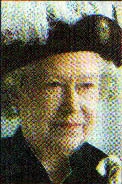|
Press Clippings
Queen to visit in March 2002

Her Majesty, Queen ELIZABETH II, is to make her fifth visit to Jamaica in March 2002 as part of her Golden Jubilee year celebrations. Her trip, however, may coincide with a time of heightened election campaigning and violence. The trip will occur two years after her son, Prince Charles’ visit of February 2000 and seven months after the visit of the British Prime Minister, Tony Blair, and his wife. “The Queen and her husband, the Duke of Edinburgh will spend two days, from the 5th to the 7th of March. This is part of a trip to some Commonwealth countries including New Zealand and she hand-picked Jamaica because she is fond of this country,” said Mags Fenner, public relations officer at the British High Commission. Jamaica is the only developing country included on the Jubilee tour. “She tends to come here on an average of 10 years and her visits coincides with key events. In 1975, her visit coincided with the Commonwealth Heads of Government meeting. Jamaica is one of the important monarchical countries, being the largest of a number of developing countries,” explained Merrick Needham, logistics and protocol consultant. Monarchical countries’ acknowledge the Queen as the Head of State. Sixteen countries of the 54 Commonwealth countries still do. The planning of the trip which is said to involve, “enormous detail” is being coordinated out of the Governor-General’s office. “Logistics have not been worked out as yet so I can’t say yet where she will visit, but the trip will be mainly restful rather than stressful. Her visit also coincides with the celebration of Jamaica’s 40th year of Independence,” said Geoffrey Madden, secretary to Governor-General Sir Howard Cooke. Though the timing of the trip is celebratory, it also occurs when the political parties have ‘begun campaigning for general elections, constitutionally due by December 2002. Since the start, of the year there has been flare-ups of politically incited violence in several parts of Kingston and St Andrew. But observers say,’ a visit to Jamaica during that time would not place Her Royal Majesty in harm’s way. “There is still a left-over aura of her influence, her august presence might cool tempers. There is also still a fascination with ‘white people’ and it seems that only the black and poor get killed in Jamaica, so she would be quite safe, though I wouldn’t advise that she visits the volatile area,” said Hartley Neita, communications consultant and historian. Mr. Madden also stated, that “security is, as always, an important element.” The Jamaica Defence Force and the Jamaica Constabulary Force are involved in the planning to provide security, logistic support as well as the ceremonial fanfare that usually accompanies such a high-level visit. But, while plans are being made to welcome Her Majesty, some Jamaicans, particularly members of the Rastafarian community are indifferent. “As Rastafarians our position never changes. The Queens represents the colonial masters that oppressed black people for so many years. She is a part of Babylon and Babylon will have to fall,” said Ras Sydney DaSilva, president of the Rastafarian Centralisation Organisation (RCO). This was the same attitude to Prince Charles’s February 2000 visit. “Prince Charles. was’ seen in the paper with a red, gold and green tam turned backward. To some that was just a gesture but that was an insult to Rastafarianism. Neither he nor the Queen has done anything for the movement, so her coming has nothing to do with me.” Ras DaSilva said coolly. The cost of the trip has not yet been determined as the Governor-General’s office is yet to present a proposal to the Ministry of Finance. But the customary activity of beautifying the routes along which the Royal visitor will be travelling, is expected. “We would, of course, try to show Jamaica to its advantage….we don’t what route she will take but as is customary, we will ‘prettify’ the area,” Mr. Madden said. |